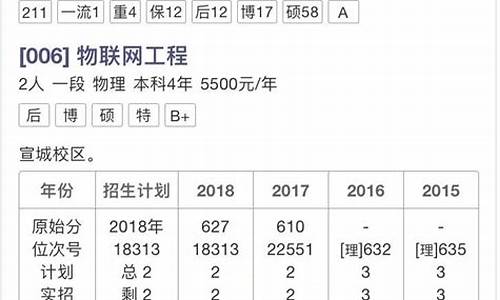您现在的位置是: 首页 > 专业报考 专业报考
2017年高考卷英语,2017高考英语丙答案
tamoadmin 2024-05-15 人已围观
简介一、。 1.A 2.C 3.A 4. B 5. D 二、 1. Have you ever swum 2. he hasn’t visited 3. hasn’t won any prizes 4. I’ve alwayswanted to help you 5. has already invite us to trave

一、。 1.A 2.C 3.A 4. B 5. D
二、 1. Have you ever swum 2. he hasn’t visited 3. hasn’t won any prizes 4. I’ve alwayswanted to help you 5. has already invite us to travel 三、 1. It’s over 550metres. 2. To take in thebreath-taking view. 3. By rotating once every 72 minutes. 4. Three. / 3. 5. Some information about the CN Tower.
四、。 1.D 2.B 3.D 4.A 5.B 6.B 7.D 8.A 9.B 10.B
五、
Dear Tony, How are you? I’m having a wonderful timein Beijing now. I have done many interesting things here. I have been to manyplaces of interest. I have visited the Tian’anmen Square, the Palace Museumand the Great Wall. I have taken many nice photos of these famous places. I’llsend some to you with this email. I have also enjoyed different kinds ofChinese food. I’ve tried dumplings, noodles and roast duck. They are all verydelicious. I think Beijing is one of the biggest and busiestcities in the world. There’s a lot to see and do here. I hope we can visit Beijing together nexttime. Yours, Tom
高三英语周报外研第20期2016~2017答案
Book 7 Modules 3-4
参考答案及部分解析
参考答案
1-5 ACACC 6-10 BCBAC
11-15 ACCBB 16-20 CCBAA
21-25 CABBA 26-30 ACBAB
31-35 BADDA 36-40 GDBAF
41-45 ADDAC 46-50 BDBAB
51-55 CDCAA 56-60 CBBAC
61. impression 62. the
63. more dangerous 64. by
65. where 66. have returned
67. closely 68. how
69. healthy 70. to study
短文改错:
71. ... to their mothers. to → for
72. ... flowers were what ... were → was
73. ... I want to ... want → wanted
74. ... something differently.
differently → different
75. ... back to home ... 去掉to
76. ... my warmest wish. wish → wishes
77. ... what were very ... what → which
78. ... I read it ... it → them
79. ... I gave in ... in → up
80. ... told mother that ...
mother前加my或mother → Mother
One possible version:
Notice
Our school is to invite Wang Kuan, who washonored as one of the “People Who Moved China” in 2015, to give us a report inthe lecture hall on November 18th. The purpose is to inspire us to show concernabout the disadvantaged groups. In his lecture, Mr. Wang will share how headopted six orphans and took good care of them. He will also explain to us whathe thinks love is. The lecture starts at 3:00 pm and will last for two hours.All students are expected to be present on time and listen carefully. Pleasedon't miss it.
Students' Union
November 14
部分解析
阅读理解:
A篇(学校生活)
本文是应用文。Kaplan 教育集团是全球教育领域的领先者,本文对其优势做了简要介绍。
21. C。细节理解题。根据Why Prepare With Kaplan?部分中的make students feel confident和feel confident on Test Day可知,Kaplan帮助考生建立信心,从而取得好成绩。
22. A。词义猜测题。根据Personalized Learning部分可知,Kaplan提供个性化学习方案,即:通过老师和家庭的合作,Kaplan为学生“制定适合”他们个性化需求和目标的课程。
23. B。主旨大意题。通读全文可知,Kaplan不仅帮助学生获得自信、提供个性化的学习方案,还有全面的保证条款,这些都是Kaplan作为一家教育机构的优势。
B篇(交通)
本文是议论文。作者认为在英国开车是件令人厌烦的事情,所以他决定乘坐公共交通工具环英旅行。
24. B。细节理解题。通读全文,尤其是第一段中的Driving in Britain is such a dull experience these days,第二段中的there isn't a single feature of driving in Britain that has even thetiniest measure of enjoyment in it及第三段中的annoyances, horrible and awful可知,作者决定乘坐公共交通工具旅行是因为他讨厌在英国开车。
25. A。细节理解题。根据第二段内容可知,作者抱怨停车的种种不便:找停车位费时间、停车位狭窄、停车场收费机器不仅远而且不提供找零。
26. A。写作手法题。根据最后一段中的like traffic lights ... and motorway service areas ... 及They occupy ... appear in great numbers可知,作者通过举例说明开车是件令人厌烦的事情以及机动车对城市面貌的破坏。
27. C。篇章结构题。根据本文最后一句中的I wanted nothing to do with them on this trip及文中作者运用大量笔墨证明在英国开车是件令人厌烦的事情可推测,下文最有可能描述的是作者这次乘坐公共交通工具旅行的经历。
C篇(文娱)
本文是说明文。音乐对唤醒痴呆病人的记忆十分有用。
28. B。细节理解题。根据第一段中的plays music from her past for her. “That's Louis Armstrong,” she says ... She then recalls exact details from her life可知,这位老人的记忆是被她过去听过的一首歌唤醒的。
29. A。细节理解题。根据第二段中的form strong memories及help formmemories. Even many years later, hearing the music can bring back memories ofthese long-past events可知,本段主要讨论了音乐可以帮助人们形成深刻的记忆,多年后都可能被唤醒。
30. B。推理判断题。根据第四段中的they're in a strange place and there're not a lot of circumstancesin which someone could pull out those memories可知,如果患有痴呆症的老人住在养老院的话,由于处在不熟悉的环境中,他们很难找回回忆,因此我们应该给这些老人提供熟悉的环境,以便他们唤醒失去的记忆。
31. B。细节理解题。根据最后一段中的few studies have explored its influence on memory recall in peoplewith dementia. “It's really an untappedarea,”可知,关于音乐唤醒痴呆病人记忆功效的研究是项全新的研究。
D篇(文学与艺术)
本文是记叙文。作者从二手书店买了一本平装小说,他通过书中的蛛丝马迹对这本书之前的主人做出了各种猜测。
32. A。细节理解题。根据第三段中的The novel is a tale of various mysteries, all expertly put into awell-structured story by a very skillful author不难看出,这本小说写得很好。
33. D。细节理解题。根据倒数第四段中的But the care taken to write the translations neatly in the limitedspaces available on each page bespeaks a woman's hand可知,作者认为在有限的空间整整齐齐地标注很费劲,而能够完成这项细致工作的应该是位女性。
34. D。推理判断题。根据文中作者通过书中的蛛丝马迹对这本书之前的主人做出各种猜测可以看出,作者观察入微并且富有想象力。
35. A。标题归纳题。通读全文可知,作者根据一本平装书中的蛛丝马迹对这本书之前的主人做出了各种猜测,因此本文可以说是关于“一本平装书的故事”。
七选五:
话题:兴趣与爱好
本文是议论文。文章讨论了暴力电子游戏带来的是趣味还是伤害。
36. G。根据下句中的playing such games could make children act violently可知,“一些堆满了尸体的游戏”可能会让孩子们行为暴力。
37. D。D项“认为可以打你不喜欢的人”符合本空前的aggressivethoughts and behaviors。
38. B。根据下句中的People ... without any training ... people ... learned to controlthemselves first可推测,“在玩游戏前,有些人接受了训练,而有些人没有”。
39. A。A项“潜在的罪犯在家玩新游戏”是对本空前问题的“一个可能的解释”。
40. F。根据本文标题及全文内容可知,本文主要讨论了暴力电子游戏带来的是趣味还是伤害,故本文最后可能问的是读者对暴力电子游戏的看法:你认为“暴力电子游戏会引起不好的行为吗?”
完形填空:
话题:个人情感
本文是说明文。通过模仿别人的面部表情,我们可以更好地理解别人的感受。
41. A。根据本空前的smiles及下文多处出现的facial可知,这里指不仅我们的微笑,我们所有的“面部(facial)”表情都具有感染性。
42. D。本空前后部分之间为因果关系,故because符合此处语境。
43. D。更好地理解别人的感受“使得(allowing)”我们能够做出相应的反应。
44. A。上段中的paper提示了本题答案。
45. C。根据本空后的The model ... “try it out”可知,大脑中存在一个模型,这可能是这种模仿行为的内在“动因(cause)”。
46. B。根据本句中的they instantly “try it out”可推测,这里指人们“看到(see)”一个表情后会马上试着做出相同的表情。
47. D。根据本句中的remind them of their feelings then可推测,这里指大脑找到有关这个表情“之前的(previous)”记忆,提醒人们当时做这个表情时的感受。
48. B。根据上段中的respond accordingly及常识可知,在人际交往过程中,人们需要根据情况对他人做出“恰当的(proper)”回应。
49. A。根据上句中的their feelings可知,这里指人们模仿别人表情后引发的“情感(emotional)”反应。
50. B。这里指本段中的when people ... In this way, they can act ... 这一“过程(process)”。
51. C。52. D。根据本段中的without thefacial muscles actually making it及smile可知,有时候面部肌肉不动就能做出一个“表情(expression)”,下句“举例(Forexample)”说明。
53. C。根据本句中的smile及常识可知,笑的时候“嘴(mouths)”角上扬。
54. A。55. A。通过面部模仿“弄清楚(Figuring out)”别人的感受是我们主要的社交任务之一,但是并不是每个人都能“轻易(easy)”做到。本段中的have difficulty提示了第55题答案。
56. C。57. B。由于患有面瘫等行动障碍的人无法做出各种表情,因此他们不能通过模仿别人的表情理解并“分享(sharing)”别人的感受,也就是说通往别人感受的大门对他们而言是“关闭(closed)”的。
58. B。本文多次出现的understand(ing)提示了本题答案。
59. A。根据本空前的However, he also可知,这里指Kevin Ochsner除了指出模仿面部表情的作用外,他还“指出了(noted)” 模仿面部表情的不足。
60. C。根据本空前的not give clear clues可知,由于面部表情有时给出的提示并不清晰,因此靠面部模仿充分理解一个人所有状况下的情感状态是不“够的(enough)”。
语法填空:
61. impression。考查名词。设空处由the限定,且意为“印象”,故填impression。
62. the。考查定冠词。on the contrary意为“正相反”。
63. more dangerous。考查形容词比较级。由than可知,此处需填比较级,故填moredangerous。
64. by。考查介词。此处意为“被一头大白鲨咬”,故填by。
65. where。考查关系副词。设空处引导非限制性定语从句且在从句中作地点状语,故填where。
66. have returned。考查现在完成时。由over the past 10 years可知应用现在完成时,且that指代many great whites,故填have returned。
67. closely。考查副词。设空处修饰谓语,且意为“紧密地”,故填closely。
68. how。考查连接词。设空处引导宾语从句且修饰many,故填how。
69. healthy。考查形容词作宾补的用法。此处意为“健康的”,故填healthy。
70. to study。考查不定式作宾语的用法。hard to do sth.意为“做某事很难”。









